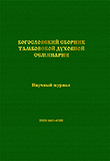Church festive vocabulary as cultural and historical memory of the people
DOI:
https://doi.org/10.51216/2687-072X_2022_4_183Keywords:
Church Slavonic, cultural and historical context, church festive vocabulary, heortological vocabulary, Metropolitan Veniamin (Fedchenkov).Abstract
The article studies the phenomenon of church festive vocabulary. It also determines its significance for the culture and history of Russia, as well as its place and role in the Church Slavonic and modern Russian languages. In the 20th century, church vocabulary found itself on the periphery of the linguistic space due to the political situation. The relevance of studying this lexical layer is due to its return to the active vocabulary in modern speech and, as a result, the interest of linguists in understanding the words of the religious sphere in a cultural and historical context. Festive vocabulary is a thematic group of church words, the focus of national spiritual traditions. Heortological vocabulary reveals the essence of the Orthodox festival, its beauty and emotional content. With the help of lexico-semantic and stylistic analysis of the work of Metropolitan Veniamin (Fedchenkov) “Reflections on the Twelve Great Feasts…”, the author shows how mastering the vocabulary of the holiday helps to comprehend the full depth and grandeur of solemn church events. The methods of questioning, generalization of information and sociological observation made it possible
to assess the state of the church festive vocabulary in modern speech usage. As a result of the study, the activation of the use of Church Slavonic words with the seme “holiday” in the modern lexical system is noted, which the author qualifies as indirect evidence of the spiritual and moral revival of society that has begun.
Downloads
References
1. Агафангел (Гагуа), игум. Значение церковнославянского языка для духовного образования / игумен Агафангел (Гагуа). – Текст : электронный // Правмир : православный портал. – URL: https://www.pravmir. ru/znachenie-tserkovnoslavyanskogo-yazyika-dlyaduhovnogo-obrazovaniya/ (дата обращения: 05.05.2022).
2. Журавлёв, В. К. Рекомендации преподавателям церковнославянского языка в воскресных школах / В. К.Журавлёв. – Текст : электронный // Полный церковнославянский словарь : сайт. – URL: http://www.slavdict.ru/art07.htm (дата обращения: 09.11.2021).
3. Дьяченко Г., свящ. Полный церковнославянский словарь : (со внесением в него важнейших древнерусских слов и выражений) / священник Григорий Дьяченко. – Москва : Отчий дом, 2007. – 1120 с. – ISBN 5-86809-048-9. – Текст : непосредственный.
4. Бахтин, М. Творчество Франсуа Рабле и народная культура средневековья и Ренессанса / М. Бахин. – Москва : Эксмо, 2015. – 640 с. – ISBN 978-5-699-74021-5. – Текст : непосредственный.
5. Гадомский, А. К. Теолингвистика: история вопроса / А. К. Гадомский // Ученые записки Таврического национального университета. Серия: Филология. – Симферополь : Таврический национальный университет. – 2005 – Т. 18 (57), № 1. – С. 16–26.
6. Киприан (Керн), архим. Литургика : гимнография и эортология / архимандрит Киприан (Керн). – Москва : Крутицкое Патриаршее Подворье, 2002. – ISBN 5-94688-034-9. – Текст : непосредственный.
7. Матфей, архим. Эортология и богословие Рождества Христова / архимандрит Матфей. – Текст : непосредственный // Журнал Московской Патриархии. – 1985. – № 1. – С. 71–78.
8. Церковные праздники русского народа: от прошлого к настоящему : сборник статей и очерков / отв. редактор О. В. Кириченко. – Москва : Институт этнологии и антропологии им. Н. Н. Миклухо-Маклая, 2011. – 458 с. – ISBN 978-5-4211-00546. – Текст : непосредственный.
9. Вениамин (Федченков), митр. Размышления о двунадесятых праздниках : от Рождества Богородицы до Сретения Господня / митрополит Вениамин (Федченков). – Москва : Правило веры, 2008. – 478 с. – ISBN 978-5-94759-074-6.
10. Вениамин (Федченков), митр. Рождество Христово. Обрезание Господне / митрополит Вениамин (Федченков). – Москва : Правило веры, 2010. – 320 с. – (Христианская жизнь. Православное богослужение). – ISBN 978-94759-110-1. – Текст : непосредственный.
REFERENCES
1. Agafangel (Gagua), Hegumen. Znachenie tserkovnoslavyanskogo yazyka dlya dukhovnogo obrazovaniya [The meaning of the Church Slavonic language for spiritual education]. Pravoslavnyi portal Pravmir [Orthodox Portal Pravmir]. (In Russian) Available at: https://www.pravmir. ru/znachenie-tserkovnoslavyanskogo-yazyikadlya-duhovnogo-obrazovaniya/ (accessed: 05.05.2022).
2. Zhuravlev V. K. Rekomendatsii prepodavatelyam tserkovnoslavyanskogo yazyka v voskresnykh shkolakh [Recommendations for teachers of the Church Slavonic language in Sunday schools]. Polny tserkovnoskavyanskii slovar’: sait [Site Complete Church Slavonic Dictionary]. (In Russian). Available at: http://www.slavdict.ru/art07.htm (accessed: 09.11.2021).
3. Dyachenko G., Priest. Polny tserkovno-slavyanskii slovar’ [Complete Church Slavonic Dictionary]. Moscow, Father’s House Publ., 2007, 1120 p. (In Russian).
4. Bakhtin M. Tvorchestvo Frantsua Rable i narodnaya kul’tura srednevekov’ya i renessansa [Creativity of Francois Rabelais and folk culture of the Middle Ages and the Renaissance]. Moscow, Eksmo Publ., 2015, 640 p. (In Russian).
5. Gadomsky A. K. Teolingvistka: istoriya voprosa [Theolinguistics: history of the issue]. Uchenye zapiski Tavricheskogo natsionalnogo universiteta. Seriya: Filologiya [Scientific Papers of Taurida National University. Series: Philology]. Simferopol, Taurida National University Publ., 2005, vol. 18 (57), no. 1, pp. 16–26. (In Russian).
6. Cyprian (Kern), Archimandrite. Liturgika: gimnografiya i eortologiya [Liturgy: hymnography and heortology]. Moscow, Krutitsy Patriarchal Compound Publ., 2002. (In Russian).
7. Matthew Archimandrite. Eortologiya i bogoslovie Rozhdestva Khristova [Heortology and theology of the Nativity of Christ]. Zhurnal Moskovskoi Patriarkhii [Journal of the Moscow Patriarchate]. 1985, no. 1, pp. 71–78. (In Russian).
8. Tserkovnye prazdniki russkogo naroda: ot proshlogo k nastoyashchemu [Church holidays of the Russian people: from the past to the present]. Moscow, Institute of Ethnology and Anthropology named after N. N. Miklukho-Maclay Publ., 2011, 458 p. (In Russian).
9. Veniamin (Fedchenkov), Metropolitan. Razmyshleniya o dvunadesyatykh prazdnikakh: ot Rozhdestva Bogoroditsy do Sreteniya Gospodnya [Reflections on the Twelve Feasts: from the Nativity of the Virgin to the Presentation of the Lord]. Moscow, Rule of Faith Publ., 2008, 478 p. (In Russian).
10. Veniamin (Fedchenkov), Metropolitan. Rozhdestvo Khrisovo. Obrezanie Gospodne [Nativity. Circumcision of the Lord]. Moscow, Rule of Faith Publ., 2010, 320 p. (In Russian).
Downloads
Published
Issue
Section
Categories
License

This work is licensed under a Creative Commons Attribution-ShareAlike 4.0 International License.

